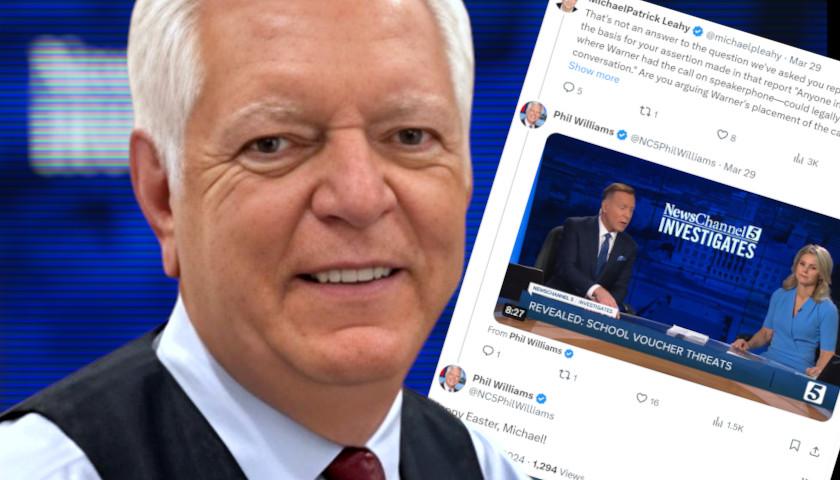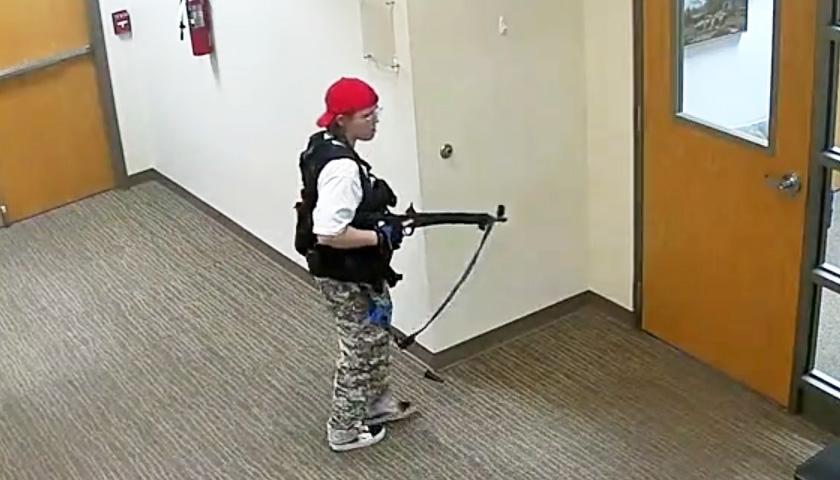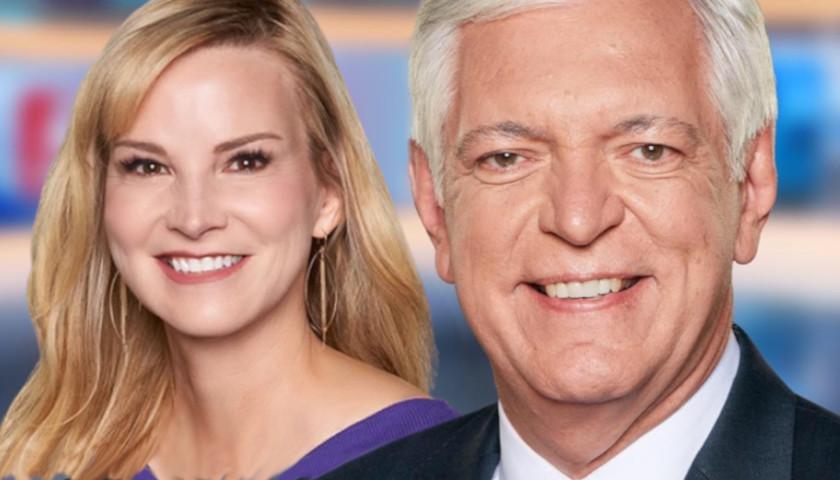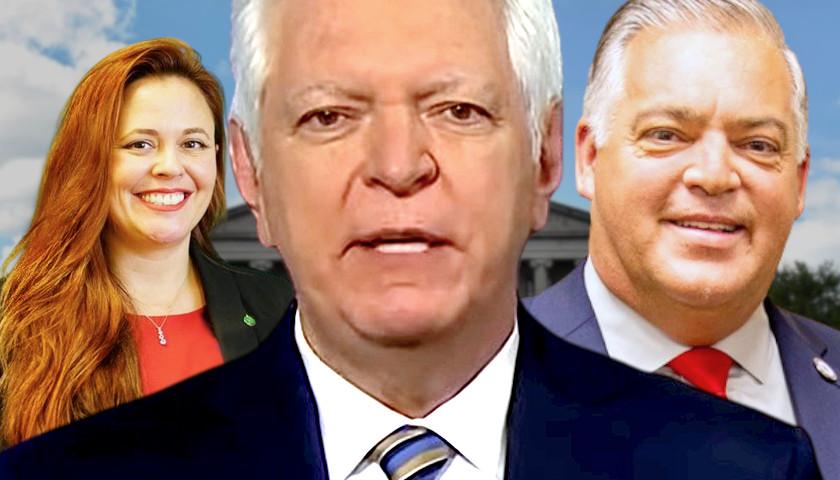Live from Music Row, Thursday morning on The Tennessee Star Report with Michael Patrick Leahy – broadcast on Nashville’s Talk Radio 98.3 and 1510 WLAC weekdays from 5:00 a.m. to 8:00 a.m. – host Leahy welcomed Columbia, Tennessee conservative mayoral candidate Debbie Matthews in-studio to discuss Independent incumbent Chaz Molder, how conservative policies work by keeping Columbia free from overwhelming small-business regulations.
Leahy: Debbie Matthews is with us this morning.
Matthews: This is sort of like my home, because my husband and I had our music business right up here on Music Row.
Leahy: So you’re familiar with Music Row?
Matthews: Yes, and it’s changed a lot, hasn’t it?
Leahy: It certainly has. And so you live in Columbia?
Matthews: I live in the historic downtown of Columbia. I own a historic home there.
Leahy: You are running for mayor. It’s purportedly not a partisan race, but it, in fact, is a partisan race.
Matthews: I think everybody in this country needs to be aware of what’s happening because where are our problems in this country? They’re in Democratic-run cities. How do Democrats keep getting elected?
And it’s because the municipalities do not have partisan races. Chicago does not. Memphis does not. Nashville does not. I was at WTN, our friends and competitors, and we were talking that Mayor Cooper was in there ahead of time when he was trying to run, and he said, I’m a conservative! I’m a conservative!
But you don’t find out till you get elected. But we have to change this. We have got to change to where it is a partisan race in all of our cities so people know.
Leahy: This particular race. You are running against the incumbent, who is, in essence, a progressive Democrat.
Matthews: Well, progressive socialist. Progressive Democrat. Yes. He’s young and it’s great, but hiding behind that Independent Party. I just want to be a mayor for everybody. It’s like, no, the first thing you did was raise our sales tax. That is not something for everyone.
Leahy: I didn’t know that. He raised your sales tax?
Matthews: There was a school we were trying to save, and he was like, if we raise our sales tax, we’ll be able to save McDowell School. Then we all said, okay, we love McDowell School. It’s a historic school.
It’s the oldest elementary school in town. Everybody was, let’s save it. Well, so tax raised. The city gave 50 percent of what they raised to the schools. It did not save McDowell. It was still torn down.
The other 50 percent of the sales tax revenue is now banked in the coffers of the city. And I’m like, that’s not good governance. That’s theft. You just stole money that you said was going somewhere else.
Leahy: So the guy’s name is Chaz Molder. Chaz. Chaz. Chaz.
Matthews: Comes from Charles Molder.
Leahy: Okay, so I’m already suspicious if your name is Chaz. Not Charles, not Chucky. (Chuckles)
Matthews: I know. And then there was a gay event that was put on by a private thing, and okay. The problem for me, though, was there was a drag show that afternoon.
Leahy: Was he all in favor of that?
Matthews: Well, he attended at least the Gay Pride portion of the morning.
Leahy: When was this?
Matthews: This was July 2021. And Columbia, Tennessee was a little shocked that there was a drag show in our arts district.
Leahy: Well, you know, there are groups that are just pushing, pushing, pushing drag shows, it’s an agenda.
Matthews: It’s an agenda.
Leahy: It’s all part of the plan to sexualize children.
Matthews: Exactly right. And so here you’re sitting here going, and I had someone from the community of the LBGTQ community call me. And I said, look, you know, I’m 57 years old.
When I grew up and lived in Nashville, these were sexualized events. They are still sexualized, and we can’t pretend that they’re not. And to mainstream them is, to me, child abuse.
Leahy: The incumbent Chaz Molder is an attorney. He’s a UT grad, graduate from the University of Memphis, and he serves as mayor.
Now describe the city governance there. I know in the county of Maury County, about 100,000 plus people growing. They have the new mayor, Sheila Butt, former state rep.
Matthews: Yes. A good Republican.
Leahy: And she’s been serving since September 1. So there’s a county commission and a mayor and they run the governance of Maury County. But within that, you have 40,000 people in the city of Columbia. In the county seat.
Describe the governance of the city, the mayor, the city council, and the city manager. How does that all work?
Matthews: The City of Columbia has a city manager-type system, so the city manager is paid to run the city. The city council consists of seven council members, five of which are ward city councilman.
Then you have a vice mayor and a mayor, and they’re the board of directors of the city of Columbia. And basically, we had a debate with Chaz Tuesday. He was like, oh, I’m just a good-feeling guy. And it’s like, no, the mayor sets the tone.
Leahy: So the mayor sets the tone for, in essence, the board of directors. Is it a paid position?
Matthews: It makes $750 a month.
Leahy: Well, $750 a month.
Matthews: But the most important thing is the mayor decides. I say they’re the neck that turns the city manager’s head on what we want to look like, you know?
And what’s unfortunate is during this time when I was on the city council, I started in 2008, we had the greatest recession since the Great Depression. The downtown was dead. There was nothing going on.
Leahy: I recall that time.
Matthews: Dead.
Leahy: Because I live just north of the Williamson County-Maury County line.
Matthews: So when I took my office here, unemployment hit, GM shuttered because Obama and Corker got into it. Downtown was completely dead. And we didn’t have a building permit pulled for like two and a half years. It was dire. But we were a conservative city council.
And we looked at each other and said, okay, we’re gonna batten down the hatches. We’re not going to raise taxes. And we didn’t. We’re not going to lay off an employee in this economy. And we didn’t.
And then we said, we’ve got to still grow and make some long-term strategic decisions. So we did a strategic growth plan. We did subdivision regulations.
We invested in Ridley Riverfront Park, our arts district, and we made the historic downtown an economic engine. If you come here today, Columbia is flourishing, and it has been.
Leahy: And that downtown district has become very popular. And it’s a very nice part of town.
Matthews: It is. But that was from us setting and making smart, conservative decisions that were for investment. Maury County is the best place to be an entrepreneur and a small business owner, especially in the downtown district.
Leahy: I don’t disagree with you on that. But tell me why, if you’re an entrepreneur of all the places in the state – and I know several folks who have actually moved their businesses to Maury County – but tell me why that’s the case. Why is Maury County the place to start a business?
Matthews: It’s a conservative community that doesn’t want regulations, and we’re having trouble with that, which we’ve got to straighten out, which is one reason I want to run for mayor.
Leahy: Is there a movement under the current mayor, Chaz Molder, to do more in the way of regulating businesses in the city of Columbia?
Listen to today’s show highlights, including this interview:
– – –
Tune in weekdays from 5:00 – 8:00 a.m. to The Tennessee Star Report with Michael Patrick Leahy on Talk Radio 98.3 FM WLAC 1510. Listen online at iHeart Radio.








